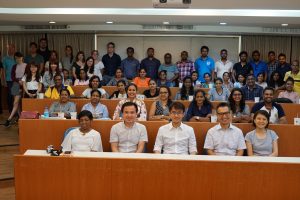Today’s guest speaker, Dr. Yuyu Chang, comes from the Department of International Business at Southern Taiwan University of Science and Technology. Professor Chang did research as a doctoral student about entrepreneurship and creative industry and has continued research in these areas. Creative entrepreneurship is the practice of setting up a business or becoming self-employed in one of the creative industries.
The class consisted of a small competition where students were divided into nine groups. There was a group of students from Sri Lanka on a special campus visit and they joined the class as well. Everyone was very excited to participate in the competition, especially when there was a prize to win for the team with the most points.
There were six questions raised by professor Chang for discussion, and in between each question professor Chang offered commentary. The questions were as follows:
1. Why do entrepreneurs want to establish their own business? (e.g. to improve the world, establish a family business, pursue a new challenge, follow a passion, attain financial independence, be one’s own boss, etc.)
2. In your opinion, in which country was creative entrepreneurship first proposed? (Originated in Australia.)
3. What exactly are creative industries? (Architecture, fashion, advertising, music, crafts, performing arts, etc.)
4. How does society benefit from creative industries? (Economic transformation, urban regeneration, employment, social inclusion, and cultural diversification.)
5. What makes creative entrepreneurship so difficult? (Culture, financial entrance barrier, rapid technology and social change, and extreme competition)
6. Concerning value creation in cultural markets, what causes consumer satisfaction? Typical economic system (utility) vs cultural market (symbolic meanings).
The concentric circle model of creative industry explains why some industries reach wider audiences when in the outer layers and make more profits. Professor Chang made an example of a comic book like Spiderman, which reaches a larger audience when made into a movie.
For creative entrepreneurship, a balance is important between originality, practicality, artistry and commerciality.
In the end professor Chang talked about Janet Echelman. Her work proposes that imagination is very important in order to survive in a creative market. Also, he shared an Albert Einstein quote: “Logic will get you from A to B. Imagination will take you everywhere.”
To have a successful carrier and a successful life, it is all about imagination.
